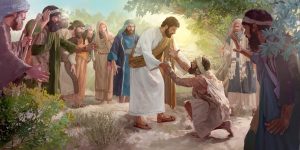
Matthew 8:2 NKJV
And behold, a leper came
and worshiped Him,
saying, “Lord, if You are willing,
You can make me clean.”
Other translations
Amplified Bible
And a leper came up to Him and bowed down before Him, saying, “Lord, if You are willing, You are able to make me clean (well).”
Christian Standard Bible
Right away a man with leprosy came up and knelt before him, saying, “Lord, if you are willing, you can make me clean.”
New American Standard Bible
And a man with leprosy came to Him and bowed down before Him, and said, “Lord, if You are willing, You can make me clean.”
Other translations
Study
A leper.
The discussion of leprosy, as to its nature, symptoms, and causes, would be at once long and difficult.
The word, which is Greek and not Hebrew in its origin, has probably been used with varying extent of meaning, sometimes including elephantiasis, or even cancer.
Even in its narrower meaning, as used by Hippocrates, leprosy was subdivided into three kinds:
▪︎ the mealy,
▪︎ the white,
▪︎ the black,
according to the appearance presented by the portions of diseased flesh.
Confining ourselves to the Biblical form of the disease, we note:
- Its probable origin in the squalor and wretchedness of the Egyptian bondage. It was the “botch,” or plague “of Egypt” (Deuteronomy 28:27).
In the Egyptian legends of the Exodus, indeed, the Israelites were said to have been expelled because they were lepers.
- Its main features were the appearance of a bright spot on the flesh, whiter than the rest, spreading, in flaming, cracking; an ichorous humour oozing from the cracks, the skin becoming hard, scaly, “as white as snow” (Exodus 4:6; 2 Kings 5:27).
One so affected was regarded as unclean; his touch brought defilement (Leviticus 13:3, 11, 15).
He was looked upon as smitten with a divine plague, and cases like those of Miriam and Gehazi gave strength to the belief.
He had to live apart from his fellows, to wear on his brow the outward sign of separation, to cry out the words of warning, “Unclean, unclean” (Leviticus 13:45).
The idea which lay at the bottom of this separation seems to have been one of abhorrence rather than precaution.
The disease was loathsome, but there is no evidence that it was contagious, or even believed to be contagious.
At the stage in which it reached its height, and the whole body was covered with the botch and scabs, the man was, by a strange contrast, declared to be ceremonially clean
Leviticus 13:12-14
¹²If the leprosy breaks out farther on the skin, and the leprosy covers all the skin of him who has the infection from his head even to his feet, as far as the priest can see, ¹³then the priest shall look, and behold, if the leprosy has covered all his body, he shall pronounce clean him who has the infection; it has all turned white and he is clean. ¹⁴But whenever raw flesh appears on him, he shall be unclean.
And in this state, therefore, the leper might return to his kindred, and take his place among the worshippers of the synagogue.
In the case now before us, the man would appear to have been as yet in the intermediate stage. Luke describes him, however, as “full of leprosy.”
Worshipped Him
Worshipped Him, i.e., as in Mark, “falling on his knees,” or in Luke, “falling on his face,” in the highest form of Eastern homage.
The act gave to the word “Lord” the emphasis of one, at least, of its higher meanings.
If thou wilt, thou canst make me clean.
The words imply either that he had seen or heard of our Lord’s works of healing, or that His words had impressed him with the belief that the Teacher must have a power extending to acts also.
There does not appear to have been any previous case of leprosy miraculously cleansed.
The words of the man involve a singular mingling of faith and distrust.
He believes in the power, he does not as yet believe in the will.
If he shared the common feeling that leprosy was the punishment of sin, he might ask: himself, Will He pity and relieve one so sinful?
Devotional
What a simple prayer: “Lord, if thou wilt, thou canst make me clean”.
It shows faith, although the leper may not have been aware of it.
The Lord can do it, that is certain, but would He also want it?
Looking at himself, it would be no wonder if he remained a leper.
But when he looks to the Lord Jesus, he believes that it is possible.
Leprosy is always the picture of sin.
That terrible disease that afflicted us all.
How do we get rid of it?
That is impossible for us.
But the things that are impossible with men are possible with God.
And all things are possible to those who believe. That faith expresses itself in prayer: “Purify me with hyssop, and my soul, now completely leprous, shall be clean and healed.
Read more of these messages at: https://devotionals.harryschoemaker.nl
Download your Bible pictures from: http://bijbelplaatjes.nl
Follow me on Twitter: @schoemakerharry
Email: devotionals@harryschoemaker.nl





